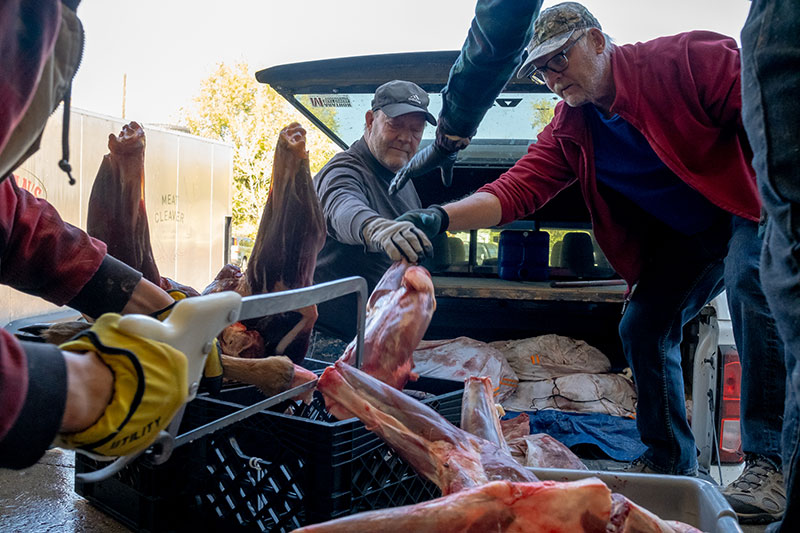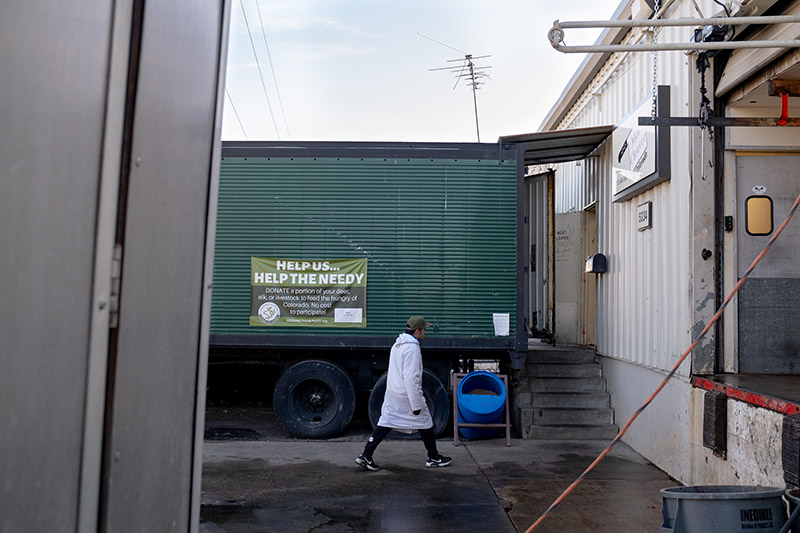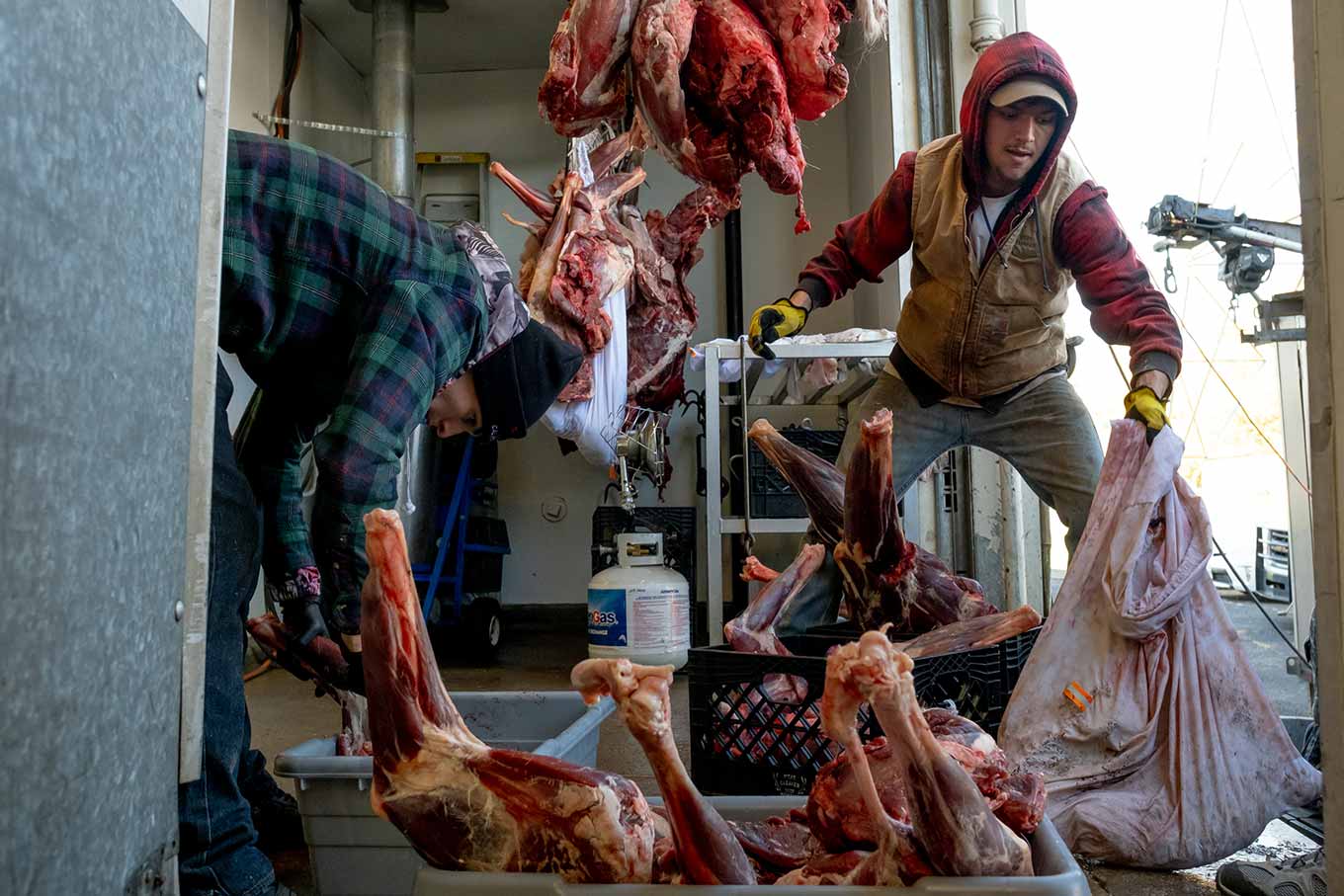
Hunters unpack wild game meat as employees work to process it on Saturday, Nov. 2, 2024, at Meat Cleaver in Denver, Colo. Meat Cleaver accepts meat donations from hunters to give to food pantries. Photo by Eli Imadali / Special to The Colorado Trust
Hunters unpack wild game meat as employees work to process it on Saturday, Nov. 2, 2024, at Meat Cleaver in Denver, Colo. Meat Cleaver accepts meat donations from hunters to give to food pantries. Photo by Eli Imadali / Special to The Colorado Trust
Hunters in Colorado sometimes wait years to obtain one of the limited number of tags, or licenses, to hunt certain animals. That’s why Ethan Janicki, a hunter who lives in Denver, was surprised to draw tags for both elk and mule deer during Colorado’s rifle seasons.
Janicki bagged one of each animal. After filling his freezer and refrigerator with meat and gifting some to his family, he donated about 50 pounds of venison to local food pantries last year through a Colorado version of a national program that connects hunters and butchers with organizations serving food-insecure families. Janicki first heard about the donation programs when he lived in Texas, but he had to work hard to find one in Colorado.
“I would have bought an extra freezer if the program didn’t exist. There are people going hungry, and we [hunters] have this resource,” Janicki said of wild game, adding that it’s organic and without hormones.
Only one wild game processor in the state, Meat Cleaver in Denver, accepts donations. Still, hunters say more awareness could boost participation at a time when demand for food assistance continues to grow. Donation efforts curtail waste from Colorado hunters and ranchers while supplying food pantries with local, healthy protein—a resource often in short supply.
Jasilyn Kendall, the operations manager at Meat Cleaver, has spearheaded efforts, overseen processing and personally delivered more than 3,000 pounds of donated game across Colorado over the past three years. Funding comes from Farmers and Hunters Feeding the Hungry (FHFH), a nonprofit Christian charity based in Maryland.
Kendall, who has experienced homelessness and food insecurity herself, said giving back to the community just makes sense.
“People go through spots in life where they find themselves without a job or falling on hard times,” Kendall said. “It feels good to give back.”

Jasilyn Kendall, manager at Meat Cleaver, picks up a box of wild game meat from the freezer on Saturday, Nov. 2, 2024 at the meat processing outfit in Denver, Colo. The meat will be donated to food pantries. Photo by Eli Imadali / Special to The Colorado Trust
National nonprofits such as FHFH and state and local programs raise money to defray the cost of butchering donated game, which can range from $100 for a deer to $700 for a bison. Such programs can also help distribute meat to local food pantries and church groups.
“Having access to game meat and ground meat was phenomenally important for the food pantry,” said Frank Just, the mayor of Fairplay, who helped Kendall distribute donated meat to the South Park Senior Center Food Bank, which serves Alma, Como, Fairplay, Hartsel and Jefferson.
Typically, the food pantry’s proteins originate as purchases from Food Bank of the Rockies, but having donated meat means those dollars can go toward other food, Just said. In two separate trips last fall, Kendall and her husband drove two large coolers, each with roughly 300 pounds of frozen meat, from Denver to the South Park Food Pantry.
Like many other places across the country, Just said his community’s needs have increased significantly with the rising cost of food.
“The meat goes pretty quick,” Just said. Entirely run by volunteers, the food bank serves 70 families and more than 170 people one Saturday a month. Just said he hoped to receive more donations from Meat Cleaver but knows that autumn is a busy time of year for Kendall and her staff.
Indeed, on a Monday morning in late September, hunters were already knocking on the door of Meat Cleaver before it opened. It was muzzle-loading season, and a queue of hunters in pickup trucks, who had been in the woods over the weekend, were bringing their animals to the loading dock for processing.
A Meat Cleaver dock worker hoisted giant shanks of elk and moose from hunters’ coolers onto metal hooks mounted on the loading dock ceiling for weighing. By the loading dock, a refrigerated trailer with a banner reading “Help Us… Help the Needy” asked hunters to donate a portion of their deer, elk or livestock to help feed people experiencing food insecurity, and at no cost to the hunters.

Christopher Camilo Ramírez walks by a banner that reads, “Help Us…Help the Needy,” on Saturday, Nov. 2, 2024. Camilo Ramírez helps process wild game meat at Meat Cleaver, in Denver, Colo. Photo by Eli Imadali / Special to The Colorado Trust
After reading a FHFH flyer and receiving encouragement from the Meat Cleaver’s owners, Kendall started taking donations a few years ago. Some donations have come from hunters with surplus meat because of an animal’s unexpected size. For example, last year, a hunter from Mississippi brought in a 900-pound bison he hunted in Colorado. He flew 700 pounds of meat home and donated 200 pounds to the program via the Meat Cleaver.
Roughly 30 hunters each season drop an animal off at Meat Cleaver for processing but don’t pick up the finished packages. Kendall calls those people “the naughty list,” and while Meat Cleaver can sell that meat after 30 days by law, she instead donates it to food pantries. (Interested food pantries can contact Meat Cleaver for more information.) Colorado Parks and Wildlife has also occasionally donated game to Meat Cleaver.
“The bulk of donations at participating butchers take place during hunting season, so we are now entering the most active time of year in most places,” said Josh Wilson, executive director at FHFH.
While Meat Cleaver is currently the only participating butcher in Colorado, Wilson said they’ve had butchers from Grand Junction in the past and would be open to adding processors in other parts of the state, especially if they can help with fundraising and promotion. FHFH pays for the meat processing but relies on fundraising in its 15 participating states.
Like FHFH, volunteers run most wild game donation programs, and just a few are funded by state wildlife agencies, said Peter Churchbourne, managing director of the Hunters’ Leadership Forum at the National Rifle Association, which began advocating for such programs in the 1980s. Churchbourne said Colorado’s program is small compared to states like Pennsylvania and Virginia, which have more robust funding and a surplus of wild game, such as whitetail deer.
“The difficulty of obtaining a tag could explain why these programs might not exist as much in Western states,” Janicki said. For example, a Colorado Parks and Wildlife spokesperson said there are wait lists and lifetime limits for tags to hunt bull moose, and other restrictions for hunting bighorn sheep and mountain goats.

Kaden Kendall, left, and Logan Garone tie up and hang wild game meat from hunters on Saturday, Nov. 2, 2024 at Meat Cleaver in Denver, Colo. Photo by Eli Imadali / Special to The Colorado Trust
Beyond game from hunters, Meat Cleaver processed a beef bull that Colorado rancher Myron Smith donated last year.
“I have not heard of anyone else doing this, and I had thought about donating for a long time,” said Smith, whose bull needed to be put down. It produced over 500 pounds of meat and cost $575 to process. Larger bulls could cost upwards of $900 to $1,200 to process, Kendall said.
“It helped two ways. I got rid of a problem bull and fed some people who needed it,” Smith said. He added that he would be interested in donating another.
Three times last year, the New Apostolic Church’s food pantry in Arvada received roughly 200 pounds of donated meat from Meat Cleaver, including venison, bison, elk and beef. Sharon Wilson, who coordinates the food pantry, said she had never heard of the program until Kendall called her. The food pantry opens its doors to 25-30 families every Wednesday morning, and Wilson said they loved being able to take home some wild game.

Márlon José Bayonne Jiménez packages stew meat from wild game on Saturday, Nov. 2, 2024, at Meat Cleaver in Denver, Colo. Photo by Eli Imadali / Special to The Colorado Trust
“They were super excited about the bison. The sausage disappeared in a blink,” said Wilson. The pantry often has other meat, but donations from Meat Cleaver appeared to be the most popular choice.
For many hunters, Churchbourne said donation programs fit an ethos of using every part of the animal hunted. Janicki likes that it’s a nongovernmental program where everyone seems to win. But he admits he had to go out of his way to find the one donation program in Colorado, and it still took extra effort to make it happen.
“Maybe there are other hunters out there like me who got luckier than they expected and have a surplus of meat that they could donate, and they don’t even realize it’s an option,” Janicki said.